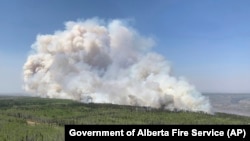Canada's main oil-producing province of Alberta faces another hot, dry weekend, with warnings of more intense wildfires after blazes forced thousands to evacuate homes and temporarily shuttered energy production.
Authorities in at least one fire-ravaged area said Saturday they have seen an increase in fire activity and were expecting more. Residents forced to evacuate early this month say they are frustrated with the indefinite displacement.
Special alerts have been declared across western Canada, and officials urged vigilance with temperatures in some areas forecast to hit 30° Celsius, 10 to 15 degrees above normal.
"We are expecting hot and dry conditions in most of the province, which will make the wildfire danger climb," Alberta Wildfire official Josee St-Onge said Friday. "We're likely to see more intense wildfire activity this weekend and into early next week."
About 30,000 people displaced
More than 100 wildfires in the past 1½ weeks forced about 30,000 people to leave home at one point. Oil and gas producers shut in at least 319,000 barrels of oil equivalent per day, or 3.7% of national production.
By Friday afternoon, 74 fires were burning across Alberta, 20 considered to be out of control, with about 16,500 evacuees.
Recent cooling and rain helped firefighters tackle some blazes and restored most of the energy production, but expectations of rising weekend temperatures have fanned worries.
"We remain in an extremely volatile situation and the risk of new wildfires remains significant in much of the province," said Colin Blair, executive director of the Alberta Emergency Management Agency.
"It will take much more than a few scattered showers to change the wildfire situation," Blair said at the briefing.
Fire and flood warnings
On Friday, the town of Drayton Valley told residents in a Facebook post that they should expect to be out of their homes "at least another week."
Authorities in Brazeau County, which includes Drayton Valley, said on Facebook on Saturday morning it had seen an increase in fire activity and expected a further increase.
The Canadian army is helping with firefighting and recovery efforts in the province, where a state of emergency has been in place since May 6.
More than 200 soldiers were deployed after Prime Minister Justin Trudeau's government approved a request for federal assistance on Thursday, with about 100 more expected to join them over the weekend.
In the west coast province of British Columbia, residents were warned to be alert for fires and floods with temperatures set to soar over the weekend. The province's energy agency predicted record-breaking power use.
Transport Canada asked in a tweet Saturday asked people not to fly drones near wildfires.
Marie Svejda, 74, has lost track of how many days she has been living in a tent on an empty lot with her mini dachshund, Peanut. She was awoken at midnight in early May at home in Drayton Valley and told she had 30 minutes to leave.
She said she does not understand why it is taking so long to get the fires under control.
"When I come back, I tell you, I will kiss the ground," she said.





